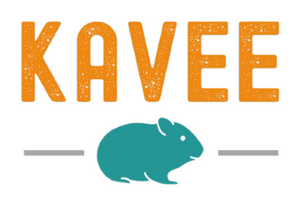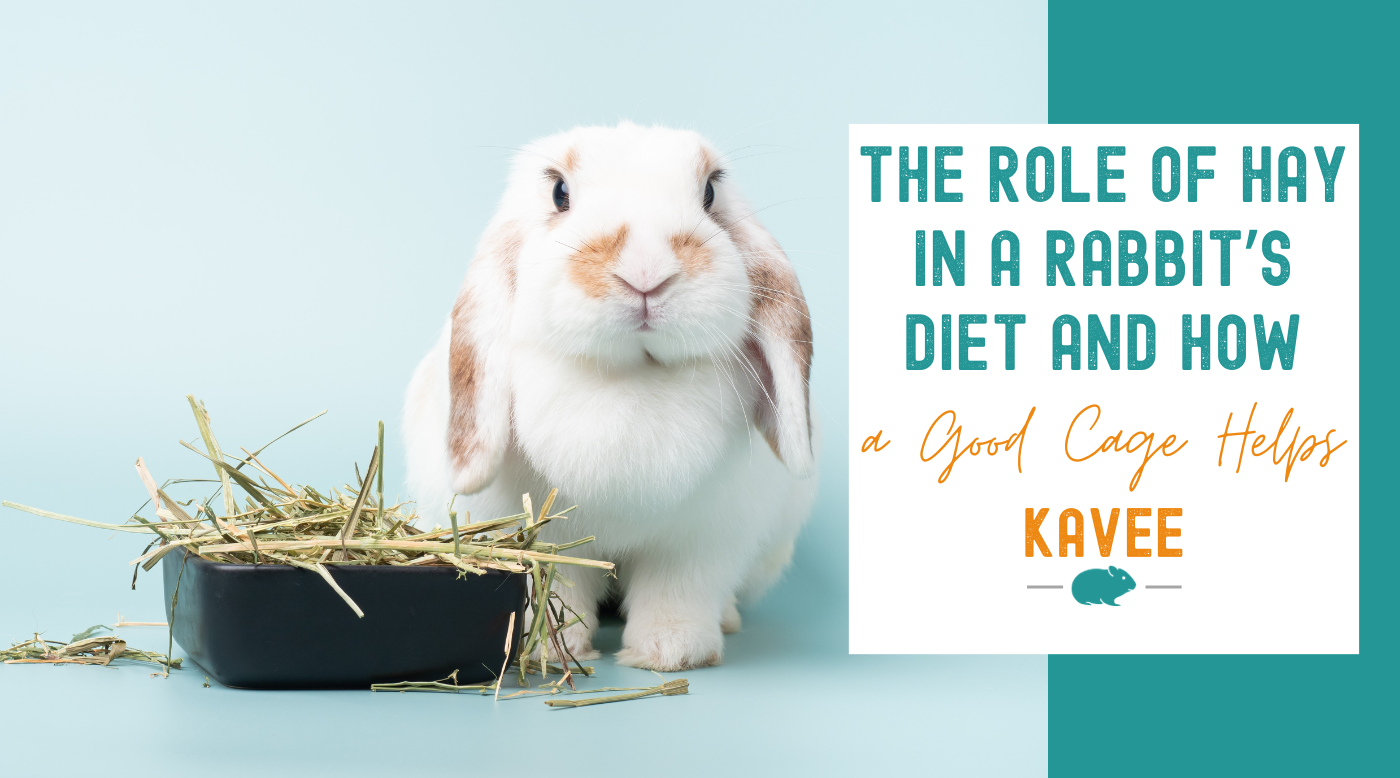If you've ever done any research on rabbits, you’ve probably already heard that hay should form the majority of your bunnies’ diet. But why is hay for rabbits so important? And how can the right rabbit cage facilitate better hay-eating habits?
While your beloved buns would no doubt also enjoy nibbling on fragrant leafy greens or delicious pellets, hay is vital for rabbit health. So let’s take a deep dive into the fascinating role of hay and why you should give your fluffy friends an unlimited supply!

Why Hay is Vital for Rabbits
Unlike other foods in a rabbit’s diet, hay is the one that should be given to them in unlimited quantities and form as much as 85% of their overall diet!
This may initially sound like a lot, but veggies and pellets should always be provided in moderation to encourage rabbits to eat more nutritious hay. Here is why hay is so beneficial to your rabbit's physical and mental health:
Hay Helps with Healthy Rabbit Digestion
Rabbits have a particularly long gastrointestinal tract, which has evolved over the years to process high-fiber foods. Hay addresses this need perfectly, keeping your rabbit’s gut healthy and their digestion moving along nicely.
Without enough hay in their diet, bunnies are at risk of a condition known as Gastrointestinal Stasis (AKA GI Stasis), which occurs when their gut slows down or even stops moving altogether. Warning symptoms include a lack of pooping, a loss of appetite, and lethargy.
Not only is it incredibly uncomfortable for bunnies - it can sadly even prove fatal if they don’t receive immediate treatment. Prevention is the best cure for GI Stasis, so to keep your bunny regular, give them plenty of fiber-rich hay.

Hay Promotes Rabbit Dental Health
If you weren't already aware, rabbits' teeth continue to grow throughout their lifetime (a bit like hooman fingernails!). And, just like nails need regular upkeep, your bunny’s teeth require a little help to keep them ground down.
Thankfully, the side-to-side chewing motion of eating coarse, long-fiber hay will naturally wear down a rabbit’s teeth. So it’s something that with the right diet, you don’t need to overly worry about.
However, without enough hay in their diet, a bunny’s teeth will grow too long and cause all sorts of nasty rabbit health problems. Like painful ‘spurs’ that cut into the gums and tongue, restricting your poor bunny’s ability to eat normally. Something that calls for immediate vet attention!

Hay Provides Mental Enrichment for Rabbits
Last but by no means least, hay is good stimulation for your rabbit’s mental wellbeing. In the wild, bunnies would have to forage for food all day long, so providing your pet bun with plenty of hay helps encourage their natural foraging instincts and keeps their minds sharp.
Rabbits are alert little animals and full of curiosity, so they will enjoy nosing through hay and nibbling on their favorite strands. They also just enjoy chewing for the sake of it, so giving them something to snack on all the time is truly ‘comfort’ food in every sense of the word - especially when they feel a little nervous or stressed.
Having an a-bun-dance of hay at their disposal also means that they’re less likely to get up to mischief! You can guarantee hours of fun (and distraction from nibbling on something they should steer clear of!) by hiding treats within the hay.

The Different Types of Hay
Hay comes in many different varieties but in a nutshell, the best type of hay for rabbits is timothy hay as it’s a grass-based hay that is made up of rough strands and high in fiber.
However, other kinds of hay can also do the job. If nothing else, it’s good to mix up your rabbit’s staple diet of timothy hay with a few varieties to give them a well-rounded nutritional profile. Plus, it also encourages them to forage for interesting flavors!
Other popular grass hays to mix into your pet rabbit’s diet include:
- Orchard hay - good for younger and older rabbits as it’s full of fiber with lots of vitamins.
- Meadow hay - consists of grass, clover, and flowers that your rabbit will love foraging through.
- Oat hay - this is the crunchiest type of hay so it’s great for dental health.
- Herbal hay - a mixture of timothy hay and herbs, this sweeter hay will be well-received by picky eaters.
One type of hay that healthy adult bunnies shouldn’t be given is alfalfa hay as it’s nutrient-dense and made from legumes rather than grass. This means that it has extra high protein and calcium content, which is best suited for young or senior bunnies. For adult rabbits, instead, it can lead to obesity, and kidney or bladder stones.

How Much Hay Should You Feed Your Rabbit
As we’ve already touched on, there is no limit on how much hay a rabbit should eat in a day. It’s quite impossible for them to overeat it, and you want to encourage them to get through plenty of it!
As a general rule of thumb, they should be given a large pile of hay around their body size every day. To start, though, you’ll need to keep an eye on how much they eat daily so that you can top them up if they get low.
Eventually, you’ll get to know instinctively how much they eat in a day and can provide them with just the right amount! You can also learn more about a balanced rabbit diet in our other blog.

The Role of Cage Design in Good Hay-Feeding Habits
Providing plentiful fresh hay is the first step when it comes to establishing good hay-feeding habits in your rabbits. But just as important (and often overlooked), is the role a well-designed cage plays in a healthy rabbit diet.
A rabbit cage that is too small, cramped, or difficult to keep clean can quickly cause fresh hay to become soiled or go to waste. Cages that have metal grids underfoot are particularly problematic, as hay can easily fall through the gaps and get urinated or pooped on.
A roomier cage that is easily accessible for daily spot cleans makes for a much nicer dining experience for your buns. A handy hay bag is also a great addition to neatly contain all hay and keep it above ground, maintaining its freshness.

How Kavee Cages Facilitate Hay Feeding
Here at Kavee, our C&C cages have been constructed with complete ease of maintenance in mind, meaning that cleaning your bunnies’ cage for any rogue strands of hay and replenishing it with fresh hay couldn’t be simpler.
This makes for a tidy, efficient, and hygienic environment in which your sweet floofs can hoppily graze away to their heart’s content! If you go a step further and opt for a plush Kavee fleece liner, it will be even easier to keep your bunnies’ cage clean as you won’t be trying to fish out stray grass hay from bedding shavings (speaking from experience, a virtually impossible task!).

Conclusion
After reading this article, we hope you’re now a true hay convert (when it comes to your rabbit’s diet, at least!). Hay should form around 85% of your bunny’s food as it’s incredibly important for their digestive system, dental health, and mental wellbeing.
Also, don’t forget that a well-designed cage goes a long way toward encouraging healthy feeding habits! So while you’re here, why not give your buns the ultimate living and dining area with our C&C cages and fleece liners!





